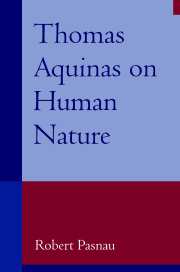Book contents
- Frontmatter
- Contents
- List of Abbreviations
- Acknowledgments
- A Note to the Reader
- Introduction
- PART I ESSENTIAL FEATURES (QQ75–76)
- 1 Body and soul
- 2 The immateriality of soul
- 3 The unity of body and soul
- 4 When human life begins
- Excursus metaphysicus: Reality as actuality
- PART II CAPACITIES (QQ77–83)
- PART III FUNCTIONS (QQ84–89)
- Epilogue: Why Did God Make Me?
- Notes
- Bibliography
- Appendix: Outline of the Treatise (ST 1a 75–89)
- Index
4 - When human life begins
Published online by Cambridge University Press: 05 June 2012
- Frontmatter
- Contents
- List of Abbreviations
- Acknowledgments
- A Note to the Reader
- Introduction
- PART I ESSENTIAL FEATURES (QQ75–76)
- 1 Body and soul
- 2 The immateriality of soul
- 3 The unity of body and soul
- 4 When human life begins
- Excursus metaphysicus: Reality as actuality
- PART II CAPACITIES (QQ77–83)
- PART III FUNCTIONS (QQ84–89)
- Epilogue: Why Did God Make Me?
- Notes
- Bibliography
- Appendix: Outline of the Treatise (ST 1a 75–89)
- Index
Summary
Generatio unius semper sit corruptio alterius.
(118.2 ad 2; see p. 124)The nutritive and sensory capacities in a human fetus are a natural result of procreation (§4.1). But unlike other animals, human beings are only partly a product of natural biological processes. The rational soul is infused by God once the fetus has developed sufficiently to receive such a soul (§4.2). Aquinas believes that this rational soul, rather than completing the developing fetus, corrupts and replaces that fetus with a different, now human, substance. These views have interesting implications for the modern abortion debate, in that they show how traditional theological conceptions of God and soul actually give us reason to deny that early-term fetuses are human beings (§4.3). All of this is underwritten by Aquinas's claim that a human being has only one substantial form, combining all of the capacities of the nutritive, sensory, and rational parts (§4.4).
Conception
The main challenge in interpreting Aquinas's account of the soul-body relationship has been to resist the appearance of an entirely ad hoc theory. The human soul's union with the body should follow as a natural consequence of more general principles about the nature of life, matter, and form. But, of course, human beings are exceptional, in that we combine the immateriality of an angel with the materiality of brute animals. We are, to use Nietzsche's phrase, a hybrid of plant and ghost (Zarathustra prologue, ch. 3).
- Type
- Chapter
- Information
- Thomas Aquinas on Human NatureA Philosophical Study of Summa Theologiae, 1a 75-89, pp. 100 - 130Publisher: Cambridge University PressPrint publication year: 2001



